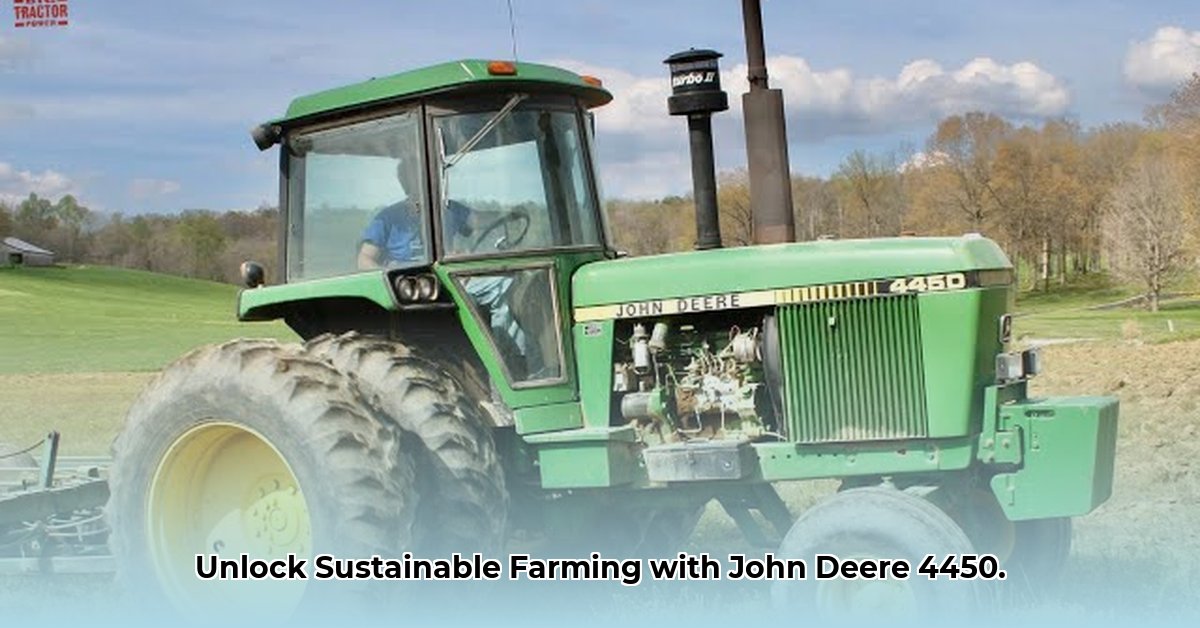
Assessing the John Deere 4450's Sustainability
The John Deere 4450 tractor, boasting a 158.2 horsepower engine and a 65-gallon fuel tank, presents a compelling case study in sustainable agricultural machinery. However, a complete assessment requires a deeper dive into its fuel efficiency, emissions profile, and overall lifecycle impact. While the raw power offers potential for efficient fieldwork—a key element of sustainable farming practices that depend on precise timing—the fuel consumption and environmental footprint remain crucial considerations. Understanding these aspects is vital for discerning farmers seeking both productivity and environmental responsibility. This analysis focuses on available information, recognizing the need for further data collection for a truly comprehensive evaluation. For more information on older John Deere models, see this useful resource.
The Caster/Action Front-Wheel Drive System: Soil Compaction and Fuel Efficiency
The John Deere 4450 features a Caster/Action front-wheel drive system, designed to reduce wheel slippage. Reduced slippage theoretically translates to improved fuel economy and decreased soil compaction. Soil compaction significantly impacts sustainable farming, hindering water absorption, reducing yields, and negatively affecting soil health. Independent verification is needed to confirm the effectiveness of the Caster/Action system in achieving these benefits. Real-world testing and comparison with conventional drive systems are crucial for substantiated claims. Does this innovative system genuinely deliver on its promises? Only rigorous data can answer definitively.
Beyond Fuel Consumption: A Lifecycle Perspective on Sustainability
Sustainable agriculture demands a holistic approach—one that considers the entire lifecycle of equipment. Therefore, evaluating only operational fuel consumption is insufficient. A comprehensive lifecycle assessment (LCA) is necessary to assess the 4450's environmental impact. This LCA should encompass the energy used in manufacturing, the materials employed in construction, and the eventual disposal or recycling of the tractor. This study would provide a more complete picture, incorporating factors such as manufacturing processes and end-of-life management. Such data is crucial for a complete evaluation of environmental impact.
Comparative Analysis: Benchmarking the John Deere 4450
To accurately assess the 4450's sustainability, a comparative analysis against competing tractors is essential. How does its fuel efficiency compare to similar models? What are its emissions levels? What are the differences in both performance and environmental impact? A detailed study, comparing fuel efficiency metrics, emissions data, and maintenance costs, would provide a valuable benchmark and help farmers compare the 4450 to its competitors. Such a comparison would offer crucial information for making informed decisions. Farmers need this data to effectively align their equipment choices with their environmental goals.
Data Gaps and Future Research Needs
Currently, definitive conclusions about the John Deere 4450's long-term sustainability are limited by a lack of comprehensive data. Further research is needed. Specifically, detailed studies on fuel consumption under varied operating conditions are required and should include independent assessments of the Caster/Action system's influence on soil compaction and fuel usage. A thorough LCA is critical to understand the full environmental impact.
Practical Steps for Sustainable Farming with the John Deere 4450
Even with limited data, farmers can take immediate steps to enhance sustainable practices with their John Deere 4450:
Meticulous Fuel Monitoring: Track fuel consumption for different tasks to pinpoint opportunities for efficiency improvements.
Field Optimization: Employ precision farming techniques–minimizing passes across fields and optimizing planting/harvesting strategies.
Proactive Maintenance: Ensure consistent maintenance for optimal fuel efficiency and extended lifespan.
Alternative Fuels: Explore alternative fuels (biodiesel, etc.) to reduce emissions.
Advocate for Research: Encourage further studies on the life-cycle impact of farm equipment.
A Balanced Perspective: Weighing the Pros and Cons
| Pros | Cons |
|---|---|
| High horsepower for efficient fieldwork | Potential high fuel consumption (requires further investigation) |
| Innovative Caster/Action front-wheel-drive system | Lack of comprehensive data on long-term sustainability |
| Durable and reliable design | Absence of readily available emission data |
| Potential reduction in soil compaction (confirmation needed) | Limited information on the overall cost of ownership and maintenance costs |
The John Deere 4450's suitability for sustainable farming necessitates careful consideration of available information and individual circumstances. This analysis serves as a starting point, urging further investigation and informed decision-making. The journey towards sustainable agriculture is ongoing, and continued learning remains crucial.
Optimizing Fuel Efficiency and Sustainable Practices
This section delves into broader strategies for enhancing fuel efficiency and adopting sustainable farming practices. While not solely focused on the John Deere 4450, these techniques apply to maximizing sustainability across all farming operations and operations with various types of tractors. It is important to understand the larger context to maximize efficiency.
Precision Agriculture Technologies: Fuel Savings and Environmental Benefits
Precision agriculture technologies are vital for sustainable farming. These technologies, which include GPS-guided tractors and variable-rate technology (VRT), allow for accurate application of inputs (fertilizers, pesticides), eliminating waste and minimizing environmental impact. This reduces fuel consumption by optimizing operations.
The Importance of Tractor Maintenance and its Sustainability Implications
Proper tractor maintenance is crucial for fuel efficiency and longevity. Regular maintenance ensures optimal performance while significantly reducing fuel consumption.
Alternative Fuels and a Sustainable Future
Investigating alternative fuels and sustainable practices such as crop rotation and cover cropping can improve soil health, reducing fuel requirements and minimizing the need for intensive tillage.
Key Takeaways:
- Fuel efficiency and reduced emissions are crucial for sustainable farming.
- Precision agriculture technologies are vital for optimizing resource use.
- Careful planning and proactive maintenance are essential components of sustainable practices.